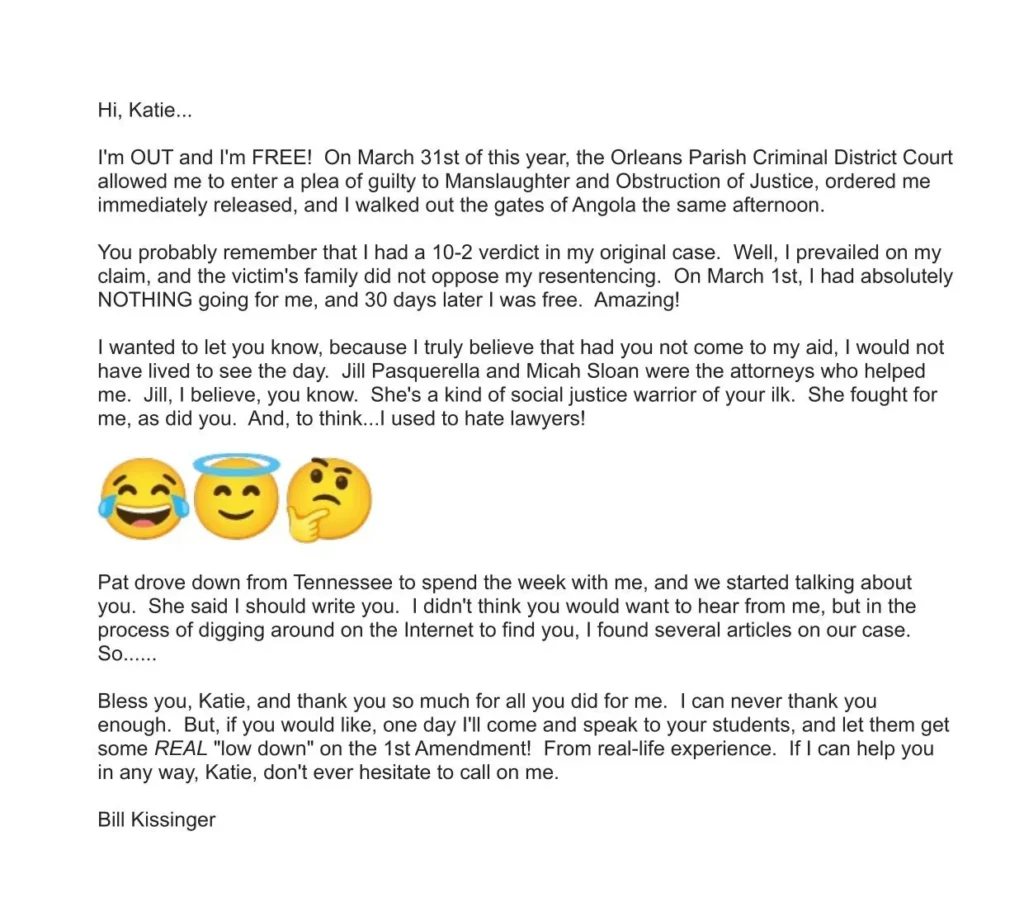
I was reading over a post that a good friend had made earlier today about what happened in his life when he exposed corruption in the Louisiana State Penitentiary and the Louisiana Board of Pardons and Paroles…the corruption reached all the way up into the Governor’s office. Doing so reminded me that I needed to get back over here and finish this story.
It is, of course, the never-ending story in Louisiana. Corruption is endemic to Louisiana. It’s something that we grow up with, and we always heard ,”Oh, yeah, cher’! It’s a pie. But everybody gets a slice of the pie.” They even have a peculiarly cute name for it: “lagniappe”.
“We picked up one excellent word – a word worth travelling to New Orleans to get; a nice limber, expressive, handy word – ‘Lagniappe.’ They pronounce it lanny-yap … When a child or a servant buys something in a shop – or even the mayor or governor, for aught I know – he finishes the operation by saying, – ‘Give me something for lagniappe.’ The shopman always responds; gives the child a bit of liquorice-root; (nb…)”: Mark Twain, Life on the Mississippi(1883)
On a totally related note, the gentleman who once famously uttered that particular “pie”-phrase served some prison time himself, I suppose, for taking too large of a slice of that same pie
Edwin Edwards, the former governor of Louisiana, served eight years in prison. He was sentenced to ten years in federal prison in 2001 after being found guilty of racketeering, extortion, money laundering, mail fraud, and wire fraud. The charges stemmed from a scheme to manipulate riverboat casino licenses. Edwards began his sentence in October 2002 and was released from prison in January 2011 to a halfway house, before being released from the halfway house in January 2011, and starting three years of probation in July 2011. He was granted an early release from probation in February 2013.
“In 1986, my wife and I exposed the largest “pardons for sale” (as it was dubbed by the media) criminal scheme in Louisiana history. The federal and state investigations that ensued sent the pardon board chairman to a federal prison, got one of the state’s most powerful legislators indicted (later acquitted), forced three prison officials into bribery guilty pleas, led to the resignation of a prison warden and a number of lesser prison officials, and, as you can imagined, pissed off a whole lot of people inside and outside of the Louisiana prison system—including then Gov. Edwin Edwards who never met a bribe he did not like.” (Billy Sinclair, FaceBook post, 8/11/25)
Billy went on to tell about the devastating effect that the incident had on his present and on his future…it would be many more years before he would see his freedom. He was branded a “snitch” by all, and allegations that he had “tarnished the integrity of the prison newsmagazine (The ANGOLITE) and violated some kind of unwritten code of journalism ethics by cooperating with law enforcement.”
“Through the co-editor’s (at the time, Wilbert Rideau) insider influence with the editorial board of the New York Times, I became the only inmate in history to ever be rebuked in an editorial by this massive media conglomerate for exposing corruption over protecting the “integrity” of The Angolite.”
Now, you see, I know a little something about (1) lagniappe, (2) corruption, (3) prison and (4) the consequences of doing “the right thing,” particularly in Angola prison. First, because I served 47 calendar years in that hellhole and, second, because I personally witnessed corruption on a daily basis, and finally because I was on the receiving end of a media-spun retaliation effort by those who dealt in the corruption plague within.
Twice.
The first occasion occurred in 1995 not long after Cain’s appearance on the state scene with his involvement in a private-sector company, Louisiana Agri-Can. The owner, Charles Sullivan, Cain and others with “high-level access, including to the Governor’s office,” had opened a can relabeling plant in the old cannery building at Main Prison. The inmates who worked there labored for hours daily at a rate of between .04 and .20 cents per hour.
At the time, I was an Inmate Counsel on the Civil Litigation Team at Main Prison, and because of a few well-known court victories, was a favored counsel to prisoners seeking assistance. When a prisoner assigned to the plant came to me with his request for help and answers to his questions, I helped, having no idea that it was the beginning of a months-long adventure involving a trip to the dungeon, field work, threats on my life via a plan to “shoot me while attempting to escape,” an emergency removal by U.S. Marshalls, a stay in the East Baton Rouge Parish Prison, multiple hearings in federal court, secretive information provided to my attorneys by an Assistant Warden, and ultimately, a financial settlement with the Department of Corrections.
I, too, was labeled a snitch – but not by prisoners. By guards. A few days after I was released from the dungeon and reassigned to the West Yard field lines, a friend came to me and told me that there was talk circulating among the guards that I could be shot while trying to escape. Much later, after I was in federal protective custody, when I was on the witness stand I was being cross-examined by Burl Cain’s attorneys. They tried to get me to tell them who told me that the guards intended to shoot me. I risked everything by refusing and looking at the judge and asking, “Your Honor, look what has happened to me. If I tell them who told me, that person has a job and is trying to feed his family and is trying to protect me. If they’ll do this to me, what do you think they’ll do to him?”
The judge ruled that I did not have to answer the question and ordered the attorney to ask his next question.
“U.S. district judge Frank Polozola ruled that Louisiana Secretary of Corrections Richard Stalder and Angola Warden Burl Cain be held in contempt. He ordered them each to contribute $1,000 to a victim compensation fund. Stalder, Cain, other wardens, assistant wardens and assorted prisoncrats were all ordered by judge Polozola to take a “refresher course” on the U.S. Constitution, particularly the First Amendment right to free speech.
The contempt ruling resulted from LA state prison officials failing to produce documents the court requested and for violating an order not to harass a prisoner. The prisoner, William Kissinger, had been employed in a private prison industry job at an Angola prison relabeling plant. Kissinger wrote a letter to federal health officials that cans of evaporated milk and tomato paste with old expiration dates were being relabeled and shipped out of the prison. “The bottom line is that Kissinger, a two-time murderer, was taking actions to protect the public,” judge Polozola said. “The DOC was taking actions that would hurt the public and protect the contract of friends.”
After Kissinger wrote two letters to the U.S. Food and Drug Administration (FDA), in which he said the can relabeling operation was “shrouded in secrecy” and “stinks of impropriety,” he was retaliated against by prisoncrats. Kissinger was transferred to a farm laborer job in a distant corner of the 18,000 acre Angola prison complex. He had been serving in the main prison as a legal advisor to other prisoners. Prison officials seized the computer Kissinger had used to assist other prisoners and to write the letters to the FDA. “Clearly this was retaliation,” said Kissinger’s attorney. “The inmate was transferred because of bad words. There is not an iron curtain between inmates and the First Amendment.”
Polozola agreed that transferring the prisoner and seizing his computer amounted to harassment, in violation of an earlier order he had issued to prevent officials from retaliating against Kissinger.”
Source: Corrections Digest
To illustrate the dangers involved in “doing the right thing,” from both sides of the fence, a meeting had been held the day before this particular hearing at the Ranch House. Burl had put a dot in the middle of a chalkboard and said, “That’s you.” Then, a circle around the dot, and an X inside the circle. “The X is you. You’re good and you’re safe.” Now, an X outside the circle. He pointed at it and said, “If that’s you, your ass is grass, and I’m gonna’ be the lawn mower.”
The next day at this hearing, my attorneys brought this conversation up when examining a witness. Burl’s jaw dropped when the attorney asked, because he now knew that someone in his inner circle had given us the information – he didn’t know where to turn. And, there was nowhere left to turn. When he finally took the stand, he could only rant and finally admit that, yes, he had retaliated against me by locking me up and ordering my computer seized. Because – ya’ ready? ‘ I had used “bad words.” Words like “shrouded in secrecy” and “stinks of impropriety,” when it literally was.
The Second War
The second occasion was 20 years later when Burl was under an investigation by Maya Lau, an investigative reporter and her team for the Advocate in Baton Rouge. This time, also, was because of the written word. I have this terrible habit of doing the right thing. And granted, it doesn’t always work out in my favor. Maya reached out to me as a source for her current investigation after she unearthed data about my first encounter with Burl and the tangled web he wove.

So, we began a correspondence that began with a letter from her requesting to be placed on my visiting list. Because of my previous confrontation with “The Boss,” as he liked to be referred to as, the letter actually shook me up a bit. I carried the letter to my Camp Security Supervisor (a Colonel) who also, incidentally, happened to be my Camp F VETS Club sponsor. I felt naturally that I could trust him if no one else to guide me through this swath of uncharted waters.
As it happened Burl Cain was scheduled to attend a party at the David Knapps Training Academy located right next door that very afternoon. So, armed with the letter and my request for direction, the Colonel went next door to seek blessings for me. It turned out that Burl didn’t show up, but his trusted Deputy Warden was there. So, the Colonel showed him the letter and explained the situation and my concerns. The response? “Man, tell Kissinger he doesn’t have to worry about that stuff. That’s all water under the bridge.”
Except, it wasn’t. Or if it was, the waters were awfully deep and swirling rapidly. We continued our correspondence and suddenly a few weeks later I found myself stripped, jumpsuited, beaten, shackled and in the back of a van to an entirely different prison far away where I languished in solitary for weeks.
Because there was a Major there who I had helped a couple of years earlier with a discrimination lawsuit against DOC, I was finally able to get a phone call. I dialed a friend and told him to immediately record our conversation so he could play it back to Maya. I had a lot of information to get out there and get out there fast. I gave him Maya’s name and stated the specifics of my situation, and stressed the urgency of it all.
To her credit and the credit of the ADVOCATE, she immediately got the ball rolling. Now they weren’t so concerned about my 1st Amendment rights – they were concerned about their 1st Amendment right and access to information. In the end, though, they did the most important thing – they secured counsel for me. One day not long afterwards, a Sergeant came to my cell and flung the door open and said, “Lawyer visit…let’s go.” And that’s how I metKatie Schwartzmann,a tough and gritty bulldog of a lawyer and a staunch defender of the 1st Amendment. The Roderick and Solange MacArthur Justice Center took my case.
It took some time and a few prison disciplinary hearings, a few “DENIED” Administrative Remedy Proceedings and about 6 months in an extended lockdown cell, before Katie finally filed my lawsuit against Burl Cain and Jimmy LeBlanc (Secretary of Corrections at the time) and about 16 other named defendants. Katie knew from the outset that it would be a difficult case, but she stuck with me and we proved that, for the second time, Louisiana had tried to silence me. It took literally two years to climb that hill. We won hands down. The single most important goal I had was getting back to Angola, back to my same dormitory and job assignment, and getting my property back. The settlement we reached accomplished all of my goals. And, hey, I didn’t forget her. Several years later after my release, I reconnected with her.

Yes, prison is tough and danger lurks around every corner. There are traps and pitfalls everywhere one looks and every time one sets their foot down. Fellow prisoners, guards – anybody – can hate you for doing the right thing. Sometimes it is very hard to do it. Sometimes you suffer. And very seldom do people appreciate what you’ve done that ended up helping them. My takeaway, though, is that when you do the right thing, well, right things happen for you. I’m just glad there were people willing to stand in that gap beside me.
Leave a Reply